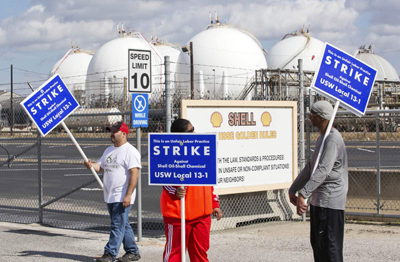 I remember the first time I crossed a strike picket line. It was at a construction site for a Holly Sugar Beet processing plant in Hereford, Texas. The electricians union who wanted higher pay for their workers called the strike. The picket line was comprised of my neighbors who I carpooled the 90 miles to the construction site with most days. Once they struck, they refused to give me a ride and were suddenly calling me a scab even though I worked in the engineer’s office on the drafting board. Serious stuff for them. Scary for me. Shut down the site for a week. That was then, this is now.
I remember the first time I crossed a strike picket line. It was at a construction site for a Holly Sugar Beet processing plant in Hereford, Texas. The electricians union who wanted higher pay for their workers called the strike. The picket line was comprised of my neighbors who I carpooled the 90 miles to the construction site with most days. Once they struck, they refused to give me a ride and were suddenly calling me a scab even though I worked in the engineer’s office on the drafting board. Serious stuff for them. Scary for me. Shut down the site for a week. That was then, this is now.
Today, members of the United Steel Workers (USW) are on a five-week strike at several of the major refineries in the country while the negotiators work to replace the “three year collective bargaining agreement that expired at the beginning of February”. The strike action is over what the unions call unfair labor practices (ULP) claiming that the industry has neglected the “health and safety” of their workers. The claims also include fatigue, inadequate staffing levels (reporting issues), contracting out of daily maintenance jobs, high out-of–pocket and health care costs. This escalation was reported on February 7 of this year after the union workers at plants in Indiana and Ohio joined striking workers at 9 refineries in California. Today, steelworkers at 15 plants in the US are on the picket lines.
Shell Oil negotiators are representing the industry in the negotiations that have been underway for over a month now. As you are probably aware, workers on strike do not get paid anything other than a stipend from the union funds.
After a month, some workers are crossing lines to go back to work to feed their families. I am sure that their fellow union members are calling them “scabs” and worse. Worse, according to an article by LM Sixel in the Houston Chronicle, three workers at the LyondellBasell plant in Houston filed charges with the National Labor Relations Board (NLRB) alleging that union officials were harassing those workers who had crossed the lines and gone back to work in the plant. Lyondell officials had already lodged a complaint with the NLRB about the same issue.
The Houston Business Journal covered a march in Houston in front of Shell Oil, Motiva and Lyondell offices by the unions who also had another march at the gates of the Marathon Oil Galveston Bay refinery in Texas City. The march called “Safe Refineries Save Lives Day of Action” is intended to raise the visibility for the striking workers.
A number of refineries are beginning to hire and relieve workers to keep the refineries open until the strike can be resolved. For the last 5 weeks, managers of the companies have kept the refineries running.
Both sides are raising the stakes and throwing counter punches. Meanwhile, the craft workers and their families are wondering how to keep their families fed during the strike.


